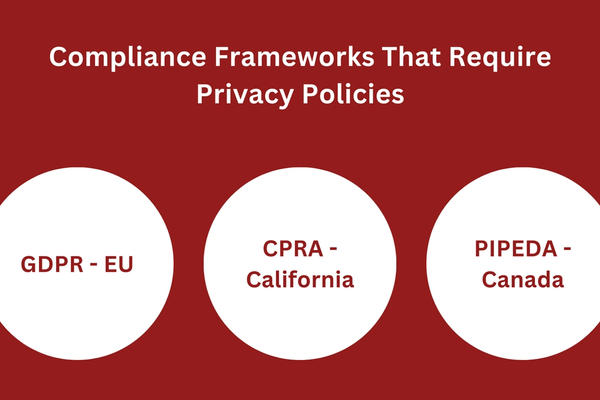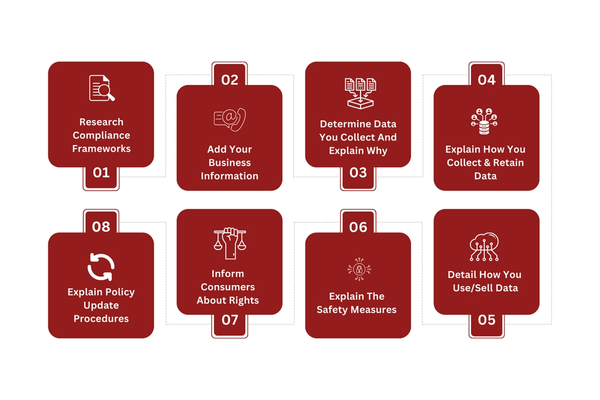If you own or manage a small business that operates online and collects data, you must have a small business privacy policy in place.
Privacy policies ensure your business meets consumer protection laws and regulations. Failing to have one can result in hefty fines and can negatively affect your business.
This article will cover what a small business privacy policy is, why your business needs one, and a practical template to help you create one.
Let’s get started.
Key Takeaways
If your business collects and processes consumer data, you must create a privacy policy for your website. A privacy policy is a legal requirement under the GDPR and CPRA, and the penalty for not complying is a hefty fine.
Your privacy policy should include your business information, your data processing and collecting practices in detail, all third parties with data access, to whom your business sells data, safety measures, and policy update procedures.
A good privacy policy is personalized to your business and uses clear language for consumers to understand. Don’t make your policy hard to access or unclear, as it will make your business seem to have something to hide.
What is a Small Business Privacy Policy?
what-is-a-small-business-privacy-policy.png

A small business privacy policy is a legal statement that describes how a website/business collects and handles consumers’ information. The statement includes what, how, and why data is collected on your website.
If your business sells consumer information to other businesses, you must also disclose what information you sell and to whom you sell it. Creating a privacy policy including this information ensures your business’s corporate compliance with consumer privacy regulations.
Compliance frameworks, like the General Data Protection Regulation (GDPR), impose heavy fines on businesses that do not comply. Businesses that collect information from consumers under the protection of this regulation are legally required to have a policy.
Aside from the legal requirement, privacy policies also create a standard of transparency for your business. With clarity, consumers are more likely to trust your business and feel they have more control over sharing their data.
If you are still determining whether your business falls under the jurisdiction of the GDPR, we can help you find out next.
Does My Small Business Need a Privacy Policy?
If your business collects consumer information, you must have a privacy policy. The size of your business, what kind of information you collect, or how you collect data does not matter.
Failing to provide an accessible, effective policy on your website can result in significant fines for your business. Your business may be held legally responsible for a data breach or leak.
To avoid these disastrous penalties, your business must create an adequate privacy policy. You can enlist the help of professionals that provide compliance services to assist you in making your policy, or you can make one on your own.
Compliance Frameworks That Require Privacy Policies
compliance-frameworks.png

To craft an effective privacy policy, you must be well-informed of the compliance frameworks that require policies for your business.
After figuring out which frameworks apply to your business, you can research the exact requirements you have to meet. Here are some of the most prominent frameworks that require a privacy policy:
General Data Protection Regulation (GDPR)
The GDPR has one of the most comprehensive scopes of regulation. This framework regulates all businesses that handle the information of European citizens, even if it is not located in Europe. The GDPR grants citizens more control and visibility over how businesses use their data.
The GDPR requires that businesses create a privacy policy that details how they use and collect consumer information and allows them specific rights over their data.
California Privacy Rights Act (CPRA)
The CPRA is another extensive framework that encompasses many businesses around the world. The CPRA regulates all businesses that process Californian consumers’ information, even if not located in California.
The CPRA sets specific standards for a business’s privacy policy. Your policy must clearly explain how you process consumer data and the rights the CPRA grants consumers.
Personal Information Protection and Electronic Documents Act (PIPEDA)
The PIPEDA is Canada’s primary data protection regulation protecting consumers and their information. PIPEDA has a smaller reach over businesses that handle Canadian citizens’ information. Only certain kinds of businesses are subject to the regulation.
However, PIPEDA requires businesses to create a privacy policy and provide easy access for consumers to view it on their websites.
How to Draft a Small Business Privacy Policy
how-to-draft-a-small-business-privacy-policy.png

It is vital to remember your business’s individual needs when creating your policy. With that in mind, below is a step-by-step template to follow when creating a privacy policy for your business:
Research Relevant Compliance Frameworks
The first step is to find all the regulations and rules in compliance frameworks that apply to your business. Your goal for this step is to research and understand all of the laws and legislation that dictate requirements for compliance.
When drafting your policy, you can enlist the help of a data protection compliance service. Your business can receive professional help from a third party. These professionals will be familiar with all data compliance regulations and ensure your business’s privacy policy meets all requirements.
Add Your Business Information
The following step is clearly listing your business’s legal name and contact information. You want consumers to have a name they can trust and a place they can easily go with questions.
You should also include your business’s location and address. Being more transparent and providing your business’s information will make you seem more trustworthy to consumers.
Determine All The Kinds Of Data You Collect And Explain Why
The next step is for your business to list and clearly explain all the data you collect from consumers.
You need to be very detailed in this section and list every data point you collect. A privacy audit can help you determine all data you collect and where you collect it from.
In this section, you will also need to add the purpose for why you collect the data that you do. For example, if you collect emails to add consumers to an email list, then the reason must be clearly listed, along with every type of information you collect.
Explain How You Collect Data And Your Data Retention Procedures
After explaining what data you collect and why, the next step is to explain how you collect it. Your business must be transparent about how you collect consumer data.
This section must also go into thorough detail. If your business automatically collects consumer data (trackers and cookies), you must explain how this works. This section is where you can include a cookies policy.
You should also include your business’s data retention policy in this section. This policy should detail how long you keep a record of a consumer’s information and how you dispose of it.
Detail How You Or Third Parties Use/Sell The Data
The next section of your policy should include what your business does with the data after it is collected. You must list all possibilities, including personalization, targeted ads, or selling to third parties.
If you sell data to third parties, you must go into detail about what information you sell and to whom, also what those third parties will use the data for.
You must also include any third party with access to the data. For example, if your business employs a third party to assist with data compliance and processes. Any roles, like privacy consultants or compliance officers that have access must be included.
Explain The Safety Measures You Have In Place
Another important section to include is a description of the safety measure you have in place to protect the data you collect. Many data privacy laws legally require this part.
Go into detail to explain your business’s data compliance solutions and any software/third parties that you utilize for data security.
Inform Consumers About Their Rights
The next step is essential and is one of the most significant parts of regulations like the CPRA and GDPR. Your business has to go into detail to inform consumers about all the rights and control they have over their information.
Explain all consumer rights and requests they can make to monitor, edit, or cancel the collection and usage of their data. Along with these rights should be explanations and links for users to follow that explain how they can exercise them.
Explain Policy Update Procedures
The final step is to explain that your business maintains the right to edit your privacy policy at any time. You must also include how consumers will be notified of these changes.
You must effectively notify consumers and explain any changes you make to your privacy policy and why.
Traits of a Good Small Business Privacy Policy
When creating your business’s privacy policy, there are things to keep in mind and avoid. Below is a list of good traits you want to include in your privacy policy:
Clear, Concise, Simple Speech
It is best to use clear and concise writing when creating your policy. Consumers should be able to digest the information and understand it easily.
Avoid jargon and legal terms as much as possible, as they confuse consumers or make them think you are trying to throw them off.
Customized and Personalized
Your privacy policy should reflect your business and its data collection practices. Customizing your policy and including the processes, compliance solutions, and third parties your business uses is crucial.
Regular Updates
It is important to keep your policy updated with any changes in data regulations or your business practices. Staying on top of regular regulation updates is crucial; your privacy policy should reflect that.
Easy Access and Opt-out buttons
Another great trait of your policy is that it is easily accessible to all consumers. There should be a prominent tab containing your policy that consumers can see and view at any time.
Your policy should also include easy access to opt-out options for consumers. It will look better for your business if it does not feel like you are hiding your policy or making it difficult ot navigate.
Not Copied From Another Site
It is not recommended to use another site as a template for your privacy policy. Your policy should ultimately reflect your business’s specific practices and nobody else’s.
An effective policy will detail how your business collects and uses data, and using another website’s policy might leave room for gaps and misinformation.
Closing
Creating an effective and detailed privacy policy is legally required for any business collecting and processing consumer data. Your business can face heavy fines if found not compliant with data privacy regulations such as the GDPR and CPRA.
To help you navigate the complex requirements of these regulations, our superheroes at Captain Compliance offer an extensive suite of services for your business to utilize.
By utilizing our services, you can rest easy knowing you are in good hands and your business will be on top of data regulations at every turn. Get in touch today!
FAQs
How Do You Write A Simple Privacy Policy?
The steps to write a privacy policy include: Researching relevant compliance frameworks, listing your business information, what data you collect and why, how you collect it, how you/third parties sell/access the data, safety measures, and policy update procedures.
Learn more about compliance frameworks.
Can You Create Your Own Privacy Policy?
You can write your own privacy policy. You do not need to enlist the help of a lawyer, and there are helpful templates online that can help you along the way.
Contact us for professional compliance services here.
Do I Need A Privacy Policy Page On My Site?
Your business needs a privacy policy page if it collects and processes consumer information on its website. Data privacy laws, like the GDPR, require a privacy policy to explain the data you collect.
Learn more about GDPR data compliance solutions.
What Happens If I Don’t Have A Privacy Policy?
Your business may be subject to fines from government agencies if you do not have a privacy policy. You may also face legal issues if consumers feel their rights have been violated. Regulations like the CPRA outline specific fines and penalties for businesses that do not have a privacy policy.
Learn more about the CCPA’s penalties.